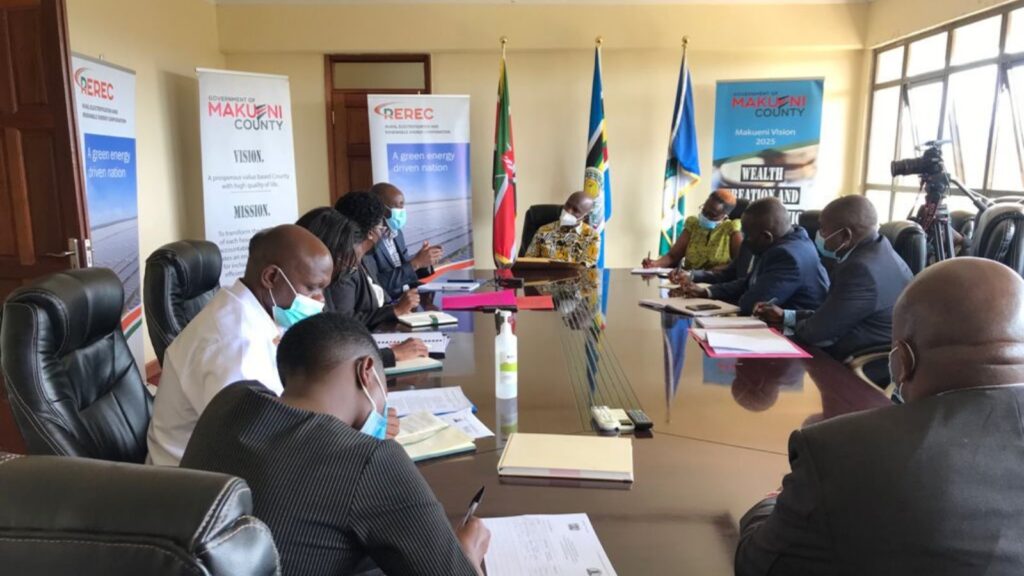Top REREC Management Suspended Over Sh500m Scandal

The chief executive of the Rural Electrification and Energy Corporation (REREC) Peter Mbugua is among top managers at the State corporation who have been suspended over fake surveys estimated to have cost over half a billion shillings.
An internal audit revealed the company paid at least Sh430 million for geospatial engineers and business consultants as well as universal land services and Theodore studies.
The audit raised red flags over irregular invoices and failed to ascertain if the surveys were indeed carried out prompting management to kick out accounting and finance staff as the board suspended the CEO pending investigations.
Mr Mbugua on Tuesday declined to comment on his suspension when Business Daily reached out via text and phone calls. He promised to call back but did not do so. The agency did not also respond to our official inquiries on the same via text messages and email.
“We make reference to an internal audit dated July 2022 where it was alleged that you prepared irregular payment invoices together with payment certificates of survey for projects that did not exist amounting to Sh430 million,” one of the suspension letters reads.
The suspension comes days after a boardroom fight saw the High Court block the appointment of eight members after a petitioner challenged Energy Cabinet Secretary Monica Juma’s picks.
The State corporation with a mandate to connect rural areas to electricity controls an annual budget of Sh9.6 billion and has seen previous bosses kicked out over misappropriation of funds.
Mr Mbugua is serving his second term as CEO of the State agency that is charged with connecting rural Kenya to the national electricity grid.
Rerec, hived off from Kenya Power, has hardly had an orderly transition of chief executives. Its first CEO Zachary Ayieko quit office in 2013 after a fallout with the board, ending his five-year stint.
His successor, Ng’ang’a Munyu, was ousted in 2017 to pave way for an audit into how billions of shillings were spent in a primary schools electrification scheme, prompting his arrest last year.
The agency has also been unable to fill board seats after High Court blocked eight members following a dispute on their appointments.
Affected directors are Wacuka Ikua (chairperson of the board), Brig Hassan Sora, Rhoda Njuguna, Wahome Gitonga, Mary Mwiti, Eva Sawe, Samuel Mugo Kimani and John Karamunya Limakamar. The court also suspended their appointments.
The court order was issued by Justice Hedwig Ong’udi in a suit filed by Mr David Simiyu, who claims the appointments breached the law over lack of competition and transparency in the recruitment.
The petitioner has also questioned CS Juma’s powers to appoint four members of the board.
Mr Mbugua replaced Mr Munyu in March 2017 and his tenure has been rocked by its share of controversies.
Rerec was accused of awarding tenders for electricity poles to companies that were controlled by the same directors, leading to the supply of substandard wooden poles for Sh800 million.
The Competition Authority of Kenya (CAK), said five out of 18 companies awarded the bids in 2019, were controlled by the same directors and submitted similar bids, raising the cost of the supplied products.
The five companies – Mashebrum Ltd, Sonara Ventures Ltd, Sums Decorators, Top Range Ventures Ltd and Tradewinds International Ltd – were investigated, found guilty and opted to settle.
The firms reached a settlement deal and were fined Sh1,305,355. The competition watchdog added that investigations on a sixth company – Naweza Investment Ltd – were still going on.
CAK launched the probe following a complaint from Inter Tropical Timber Ltd (ITTL) in September 2019, with the company accusing Rerec of tender irregularities.
The firms claimed in court of having colluded with the suppliers to render substandard products that defrauded the public.
ITTL told CAK that Rerec had been unlawfully terminating contracts and awarding them automatically to some companies and that there were cases of cross-directorship in different firms participating in the same tender.
Rerec’s mandate is to accelerate rural electrification projects across Kenya while Kenya Power-a majority State-owned company that is listed on the Nairobi Securities Exchange–manages the distribution and billing of consumers.
Its earlier strategic plan mainly focused on the connection of power to public facilities, with the Jubilee government emphasising hooking all primary schools to the national grid to enable it to launch the digital learning programme.
Now, REREC will install transformers and low-voltage lines to reach homes in remote villages. The homes will pay Kenya Power Sh15,000 for metering and linking to the grid.
The State agency is also partnering with county governments and constituencies under the National Government Constituencies Development Fund (NG-CDF) to boost rural electrification.
Under the deal, county governments and constituency development funds will meet half of the cost of bringing power grids to rural areas, with Rerec contributing the balance.
The move is meant to deepen electricity supply to rural homes and shopping centres, especially in arid and semi-arid areas.
Rerec returned a surplus of Sh7.2 billion in the year to June, according to the Treasury estimates, and has recently accelerated rural electrification projects, moving Kenya closer to the ambitious goal of universal electricity access.





